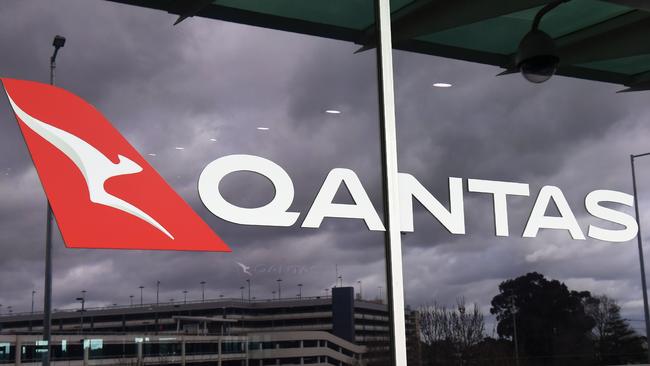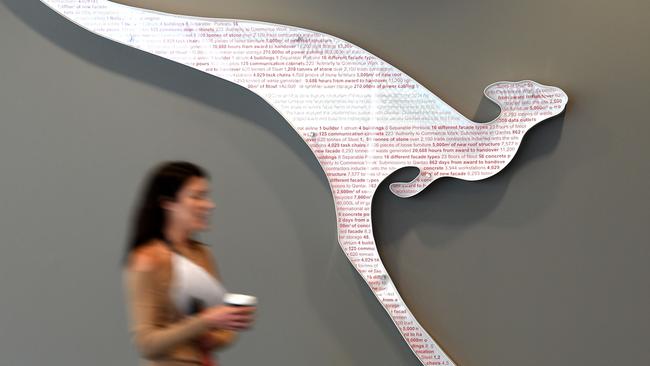Qantas counts heavy first half loss of $1.47bn, as international return delayed
Qantas boss Alan Joyce has pinned his hopes for recovery on the COVID vaccine’s ability to “change everything”.

Qantas has pinned its hopes on the COVID-19 vaccine to return the airline to profit, after sinking to a $1.47bn statutory loss in the first half of the 2021 financial year.
Border closures designed to prevent the spread of the virus were blamed for the “stark but not surprising” result, down from a $648m gain in the previous corresponding period.
Revenue fell by $7bn, 8500 jobs were axed, with the frequent-flyer program and Qantas freight the standouts for the group.
In the face of such dire circumstances, Qantas received $700m in government handouts including $459m in JobKeeper payments to 11,000 workers who remain stood down.
Despite the dismal set of figures, Qantas chief executive Alan Joyce was upbeat, declaring the COVID-19 vaccine was “changing everything”.
He said a permanent reopening of state borders appeared likely by April, based on the vaccination of frontline health workers and hotel quarantine staff, delivering a critical shot in the arm to domestic tourism.
Talks with state premiers had given him reason to believe that that was realistic, and a resumption of international travel was then expected in late October when the balance of the population was vaccinated.
“If borders are [opened] later or staggered, we’ll keep aircraft on the ground and people stood down,” Mr Joyce said.
“[October] is our best estimate at the moment and we have to put an estimate out there because we have to give some certainty to our people. We also want to give consumers some confidence.”
Although Qantas planned to offer flights to 22 of its 25 overseas destinations, Mr Joyce said about 60 per cent fewer seats would be available compared to pre-COVID capacity.
That was due to the use of Boeing 787s in the place of A380s on key routes such as Sydney to London, and Sydney to Los Angeles and Dallas.

Qantas chief financial officer Vanessa Hudson said even with a written-down value of $490m, the A380s remained an “incredibly valuable aircraft” to the airline, and they would not be left to rust in the Californian desert.
“Half of those [12] aircraft have been reconfigured with a brand new product, and it serves routes that have slot constraints,” Ms Hudson said.
“In those circumstances, flying a bigger aircraft delivers significant cash benefits.”
To help stimulate demand for travel, airfares were tipped to be competitive for domestic and international flights.
Mr Joyce said he would rather “earn a dollar in the air than lose a dollar on the ground” in what should be a win for travellers.
“We are seeing a lot of empty seats [on domestic flights],” Mr Joyce said.
“Even though we’re back to 60 per cent of our pre-COVID schedule, Qantas’s seat factor, the amount of seats occupied, is down by 20 points so we’ve got to fill them.”
He also indicated that Qantas would continue to operate new regional routes where demand existed, even if it meant upsetting rival Rex.
The regional carrier took aim at Qantas this week, blaming the carrier for squeezing its profits on key routes by adding capacity.
Mr Joyce laughed off the criticism, likening Rex’s “angry public statements” to Donald Trump’s behaviour. “I sometimes think they have Donald Trump writing for them. They’re very Trumpian in a lot of ways. Very funny, we get a good laugh out of them,” Mr Joyce said.
The heavy half-year loss had little effect on the Qantas share price, which closed up 9c at $5.10.
Qantas’s underlying loss, which strips out redundancy charges and other one-off costs, came in at $1.03bn for the December half. This compares to a $775m profit for the same period a year earlier, when there was no COVID impact.
With Virgin Australia flying a much reduced schedule and Tigerair gone, the domestic market share for Qantas and Jetstar rose to about 70 per cent.

Qantas International recorded a loss of $549m in underlying earnings before interest and tax, whereas Qantas Loyalty achieved a $125m EBIT, down 29 per cent on the 2020 half year.
Market analysts said the results were in line with expectations, and “the business was coping well with the volatile trading environment”.
JPMorgan analyst Richard Jones said Qantas was doing “a great job managing costs in light of the huge hit revenue”.
“Its balance sheet is feeling the impact with net debt up to $6.1bn, and above its target range (of $4.5bn-$5.6bn),” Mr Jones said.
“This is expected to rise in the second half as further redundancy payments are made in the third quarter, before reducing in the fourth quarter.”
Macquarie analyst David Fabris noted that domestic flying was becoming more sustainable considering COVID controls and the vaccine rollout.
“On the international side, the rollout and success of the vaccine and policies will dictate that recovery,” Mr Fabris said.
Moody’s Investors Service vice-president Ian Chitterer also saw reason for optimism despite the “unsurprisingly weak” first-half results.
“We expect Qantas to emerge from the pandemic in a strong position and with an increased domestic market share, given its excellent business profile,” Mr Chitterer said.
“Qantas’s liquidity will be key to its ability in managing through this period of uncertainty while positioning the business for a recovery.”






To join the conversation, please log in. Don't have an account? Register
Join the conversation, you are commenting as Logout